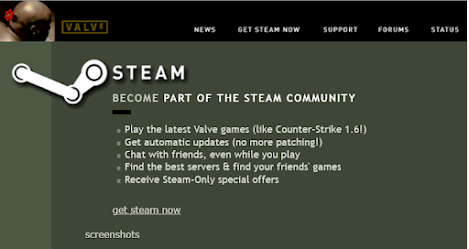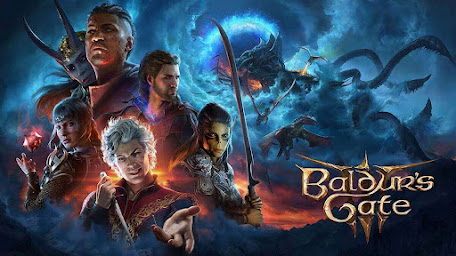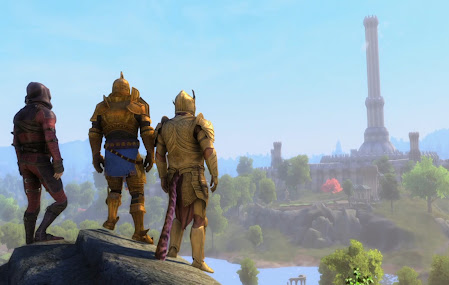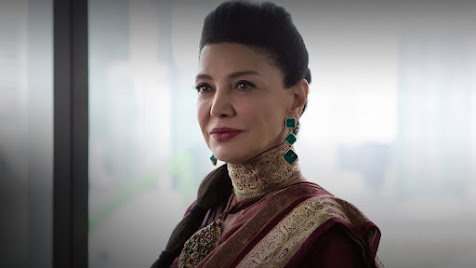PC video game distribution platform Steam turns twenty years old today. Normally that wouldn't be a major milestone outside of technical interest, but Steam's achievements and position in the industry remain unique, despite some criticisms.

PC games company Valve Corporation launched Steam on 12 September 2003. The first - and for a while only - thing you could do on Steam was use it to patch up your existing Steam games, particularly Counter-Strike. The service did not even have a store front on release. Valve had identified the enthusiasm for online multiplayer early, but also identified that many gamers experienced frustration when new patches were released, as these tended to be released ad hoc and it sometimes took days for them to be disseminated over the entire playerbase. Valve proposed developing a universal updating service with several other companies, including Microsoft, but were shot down. They began development of their own service in 2002. This idea wasn't totally new, as Blizzard had released their Battle.Net service at the end of 1996, but Steam was working on a different scale.
Valve quickly realised the same system could be used to sell and download games in their entirety. Valve ran videos and interviews demonstrating how this would work with the video game Impossible Creatures by Relic Entertainment, with the entire game being downloaded over broadband in just a few hours. Ironically, Impossible Creatures would not be actually released on Steam until 2015.
Valve also sold the benefits of the service for combating piracy, which was widely believed at the time to be killing the PC gaming market. This led to consternation from gamers, already wary of DRM (Digital Rights Management) software trying to restrict when and where they could play games. To assuage concerns, Valve also demonstrated that the system could be used as a mass distribution system for free mods by releasing the popular Half-Life mod Day of Defeat on the service.
After a successful launch, Valve shut down all of their other online matchmaking and updating websites and systems, effectively forcing gamers to migrate to Steam over the course of 2004, to some controversy.
On 16 November 2004, Valve released Half-Life 2. One of the most eagerly-awaited games of all time up to that point, preceded by months of hype, Half-Life 2 was sold at retail and as a Steam download, but all copies of the game had to be activated and authenticated on Steam, even if the game was to be played solely offline in single-player mode. This led to vast criticism and anger from both critics and the gaming community, as broadband internet was still in its relative infancy. However, Valve stuck to their guns and the game's overwhelmingly positive reviews saw a million copies sold worldwide within a relatively short timeframe. Shortly after release Valve demonstrated the versatility and convenience of Steam by releasing an extra bonus level, Half-Life 2: The Lost Coast via the service.
In 2005 Valve signed its first distribution agreement with third-party vendors. The first third-party game was Rag Doll King Fu, followed quickly by the more acclaimed Darwinia. Over the next few years numerous other publishers and developers jumped on board, attracted by the company's generous royalty cut (far superior to boxed retail). Critics continued to complain loudly about the service being a form of intrusive DRM, but fans began to see the convenience of having all their games, multiplayer services and achievements in one place.
It is possible that Steam would have remained a relatively minor success, especially as Valve proved reluctant to release more high-profile original games, but the PC gaming market underwent serious contraction after the release of the Xbox 360 console in 2005 and the PlayStation 3 the following year. Both consoles had comparable power to gaming PCs of the time and pushed the development of HD graphics at a much more affordable price. The result was something of a stampede of gamers to the new consoles, including PC gamers who previously would have not considered switching to console but were lured over by the likes of the Halo series on Xbox. Previously PC-centric developers like Bethesda were also focusing heavily on the console versions of their next-generation games, like The Elder Scrolls IV: Oblivion (2006) and Fallout 3 (2008). For several years the future of PC gaming appeared to be in doubt.
The result was an explosion in the indie game sector starting in the late 2000s, alongside Valve using numerous inducements to try to get PC publishers and developers to rally around Steam as a centralised, global launch platform for their games. Valve also initiated aggressively-priced "Steam Sales," sometimes selling games just a year or two old for heavy discounts. This approach proved successful, if again controversial, and PC games began to see an uptick in sales again towards the end of the decade. A good sign of Steam's success was the appearance of competitor products: Ubisoft launched the Ubisoft Games Launcher (aka Ubisoft Connect, later UPlay) in November 2009 and Electronic Arts launched Origin in June 2011.
An earlier competitor was Polish company CD Projekt. The company had enjoyed success by launching its first original game, The Witcher on Steam (as well as physical release) in 2007. In 2008 they launched Good Old Games, a variation on Steam which focused on older, out-of-print games and employing patches and community knowledge in making them compatible with modern systems. CDPR won early victories by recruiting Interplay and Ubisoft to their cause. In 2010, rebranded as GoG, they carried out a successful relaunch spearheaded by the re-release of classic CRPG Baldur's Gate. Valve noted CDPR's success and began launching older games themselves, although generally without the care and attention GoG spent on compatibility.
By the early 2010s, Steam had established itself as the de facto global PC games storefront, to the point that many bricks-and-mortar video game stores dramatically reduced or even removed physical PC games from sale. Most games sold physically still needed to be activated on Steam anyway. Steam users became numerous and passionate, calling for boycotts of other launchers from companies who refused to release on Steam as well, citing the inconvenience of managing multiple launchers and software. The success of Steam also encouraged the further development of Microsoft, Nintendo and Sony's inhouse storefronts for their consoles (several attempts to create console versions of Steam came to nothing).
By 2020, most rivals had admitted defeat, with both Electronic Arts and Ubisoft agreeing to release their games via Steam once again. In 2022 EA discontinued Origin in favour of the EA App, which allows former Origin players to continue accessing their games.
In late 2018, Epic Games, flush with cash from their game Fortnite, launched a service designed to directly take the fight to Steam. The Epic Game Store used aggressive pricing, a more generous royalty scheme and the promise of completely free AAA games to aggressively expand. However, the service was hugely criticised during its launch phase for lacking basic functions like a shopping basket and user reviews, whilst Epic's attempt to lock in some games to exclusivity periods with them in return for buckets of cash was criticised as anti-consumer. It took several years to implement basic features and remains controversial, despite the number of Epic exclusives tailing off as developers discovered that the bad will engendered from not launching on Steam often outstripped the short-term financial benefits of accepting Epic's pricing terms.
Steam enjoyed a further shot in the arm thanks to the COVID pandemic, with the number of people using the service seeing a sharp increase as they were stuck at home with, in some cases, not much to do other than play video games.
In 2023, Steam is the overwhelmingly dominant games delivery service for the PC format. The service continues to set new records for concurrent players - the latest high of over 33 million was reached earlier this year - and now every major publisher and almost all publishers full stop use Steam as their main launch system. Rivals continue to hang in there - GoG has continued goodwill from its attempts to track down and release older games and Epic Games is continuing to try to make inroads through exclusives and free games - but many have thrown in the towel and admitted defeat.
Criticisms of Steam and its monopoly-like position in the marketplace continue, with criticism of the service sometimes pushing shovelware games released without much attention to quality (or sometimes copyright). The service has sometimes been used for cheating, toxic behaviour and even fraudulent activities, which Valve has sometimes acted decisively to stamp out and, at other times, less decisively. However, Steam has also been praised for almost single-handedly saving PC gaming as a viable format during the 2005-10 period when its future might otherwise have been in doubt, and for prioritising convenience and ease of use for customers.
Probably the biggest and most viable criticism of Steam has been its impact on Valve, its creators. Valve used to create vibrant, exciting and original video games. Steam has given them an astonishing annual income (comfortably in the billions of dollars) which frees them from having to rush games or, indeed, do much work on original games at all. Although Valve continued to publish popular titles in the first few years after Steam launched - Portal (2007), Team Fortress 2 (2007), Left 4 Dead (2008), Portal 2 (2011), Counter-Strike: Global Offensive (2012) and Dota 2 (2013) - it is also unquestionable that their financial security has meant they are not under any pressure to actually make new games. The Half-Life franchise was left on a massive cliffhanger with the release of Half-Life 2: Episode Two in 2007 and the company has so far failed to follow up on it, although VR prequel Half-Life: Alyx (2021) hints at how the series might continue.
My main abiding memory of the first time I used Steam was strewing network cables across my house, to my landlady's consternation, as I tried to get Half-Life 2 to work on its release day. I now have 484 games on the service with some 5,769 hours spent on them (which isn't as bad as I'd feared, spread over nineteen years). My most-played games on the service are Age of Empires II: Definitive Edition, Fallout 4, Cyberpunk 2077, The Elder Scrolls V: Skyrim, BattleTech, XCOM: Enemy Unknown/Enemy Within, Death Stranding, Mass Effect: Legendary Edition, Grand Theft Auto IV/Episodes from Liberty City and The Witcher III: Wild Hunt. Many of the criticisms and wariness about the service remain valid, but I think without Steam, it's questionable if PC gaming would have survived, let alone thrived as it has.






